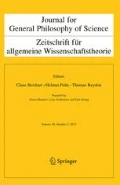Summary
Recent challenges of the mechanistic world picture seem only to have strengthened the position of mathematics. So it continues to guarantee perfect predictability, the dream of physicalism. During recent decades, however, computer simulations have shown mathematicians that even simple sets of equations may have, not an exact, but a whole range of solutions. With some of their examples we demonstrate the unpredictable behavior of simple systems. As a result, the dream is over. On the other hand, mathematicians also discovered that previously ‘chaotic’ phenomena could be represented by relatively simple formules. This leads to a dramatic increase in the explanatory power of mathematics. This change of the scientific scenery will have a profound methodological impact on the relationship between the natural and the other sciences.
Similar content being viewed by others
Author information
Authors and Affiliations
Rights and permissions
About this article
Cite this article
Schopman, J. Chaos theory, the end of physicialism?. J Gen Philos Sci 26, 135–142 (1995). https://doi.org/10.1007/BF01130930
Published:
Issue Date:
DOI: https://doi.org/10.1007/BF01130930




